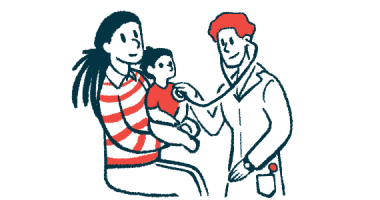#AANAM – OV101 Improves Motor Function, Sleep, Behavior, Phase 2 Trial Shows

Ovid Therapeutics’ experimental therapy OV101 has been shown to improve sleep, motor function, communication skills, and reduce challenging behavior and anxiety in patients with Angelman syndrome in a Phase 2 study.
Results from the trial were recently discussed at the 2019 American Academy of Neurology’s (AAN) Annual Meeting (AANAM) in Philadelphia. The oral presentation was titled, “STARS: Results from a safety and efficacy study of OV101 (gaboxadol) in adults and adolescents with Angelman syndrome” (abstract 004).
OV101, also known as gaboxadol, is an orally available compound being developed to restore the brain’s ability to filter real nerve signals through a process known as tonic inhibition. By binding and selectively activating GABAA receptors located on the surface of nerve cells, OV101 is thought to be able to reverse perturbations caused by mutations in the UBE3A gene, which underlie Angelman syndrome.
Studies suggest that tonic inhibition is diminished in Angelman syndrome. As a result, the brain becomes overloaded by different stimuli, which can trigger disease-related symptoms including seizures and jerky movements.
Researchers have evaluated OV101’s safety, tolerability, and efficacy in adults and adolescents with Angelman syndrome in a randomized, double-blind, placebo-controlled Phase 2 trial (STARS, NCT02996305).
Seventy-eight patients were randomly assigned to receive OV101 once daily (15 mg at night), OV101 twice daily (10 mg in the morning and 15 mg at night), or a placebo twice a day, for three months.
During the trial the treatment was found to be in general safe, with most adverse events being mild and no differences found among the study groups.
Three months after therapy initiation, patients treated with OV101 fell asleep faster and had significant improvements in overall sleep and motor function, compared to those in the placebo group. In addition, patients who showed significant clinical improvements also showed better communication abilities and reduced incidence of challenging behavior and anxiety symptoms.
“This is the first clinical study to show OV101’s positive effects on people with Angelman syndrome,” supporting the continuance of OV101’s development, researchers stated.
“Ovid’s research efforts are focused on finding treatments for rare diseases, which are defined in the U.S. as conditions affecting fewer than 200,000 people, and specifically, we seek to improve the lives of the approximately 8 million people in the U.S. alone living with neurologic manifestations of rare diseases,” Amit Rakhit, MD, MBA, chief medical officer and head of research and development at Ovid Therapeutics, said in a press release.
Ovid Therapeutics is now recruiting patients with Angelman syndrome for a Phase 2 trial (ELARA, NCT03882918) designed to assess the long-term (52 weeks) safety of OV101. Patients who participated in the STARS trial are eligible to enter this novel, open-label study, as well as those who completed OV101’s Phase 1 study (NCT03109756).
For more information about this long-term study, such as contacts and locations, please visit the trial’s website.
The company also expects to start the NEPTUNE study, a worldwide Phase 3 trial of OV101 in children with Angelman syndrome, before the end of the year.






